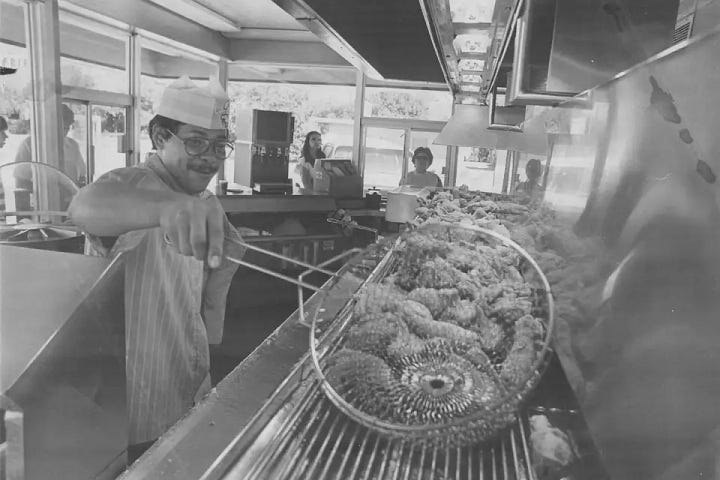Zen and the Art of Frying Chicken
a delicious meditation
Those of you who know me are aware that I worked in the fast-food industry before becoming a chiropractor. My first job was at a Hardee's restaurant when I was fifteen.
I wanted to buy a car, which is why I started working. Once I bought the car, I realized I needed to continue working to maintain it, pay for gas, insurance, and the occasional "going out" money.
In the restaurant business, if you work at a place long enough, someone hands you a set of keys and puts you in charge of something.
So here I was, running a restaurant and in charge of a bunch of people, when I could barely take care of myself. Anyway, I was making what I thought was decent money for a 19-year-old.
My bosses started a new restaurant venture, and little by little, they began poaching the old management staff from Hardee’s. Eventually, they asked me to come work for them.
My new job was running a Church's Chicken. The stores were small, mostly takeout. The menu was small, and we didn't have many employees to manage. We didn't have a good reputation in the community due to poor management.
The owners introduced new registers, and sales immediately jumped. I suppose all the food was now being rung up and accounted for!
We cleaned up the restaurant and made sure we were putting out a good product, and guess what?
Sales doubled.
So here I am, thinking I know what I'm doing because I'm getting recognition from my bosses.
I didn't have the interpersonal skills to manage people effectively.
One time, I got into it with an employee but couldn't confront him to fire him, so I deleted him from the time clock. Let someone else deal with that.
Dealing with customers was usually okay because if they had an issue, you could just fix the problem, and that was it. Handling employees was a bit more challenging for me.
On busy days-Fridays, Saturdays, and Mother's Day (they called that the day after the welfare checks came out)
The restaurant would get so busy that sometimes people would line up around the building, and I felt that everyone was staring at me, which made me feel uncomfortable.
The store had windows all around; it was like a fishbowl-everyone saw everything.
I could have gone to hide in the office, but I needed to help out. I liked to run a tight ship labor-wise, so I always counted myself as one of the staff needed.
I would ask the cook to let me make the chicken and assign them some other tasks.
Even though I was probably even more visible than before, I would get lost in the work.
Everything was hand-breaded and battered. To me, it was like a Japanese tea ceremony.
When it was busy, we cooked a full "stove," which was 4 chickens at a time:
8 legs, 8 thighs, 8 wings, and 8 breasts.
The process was:
Flour, dip in batter, flour again.
Start with the legs because they take the longest to cook.
Continue until everything is in the fryer.
Repeat,
and repeat,
and repeat.
I would get lost in the work. You couldn't really rush things. I made sure everything was done by the book.
Focusing on one task so intently that every concern, every worry just faded away. I knew people were watching me cook the chicken in this fishbowl, but I was so engrossed in my task that I didn’t care.
All my stress and anxiety just faded.
I still try to lose myself in my work, only now it’s not frying chicken-it’s adjusting spines.
Now that I think about it, same situation. I’m “on stage” in my adjusting space with clients sitting in the waiting area.
Sometimes, I get stressed when there are a lot of people waiting on me…but I’m gonna do my best work frying this chi…
oops!
I mean adjusting this spine.
Zen teaching often emphasizes simplicity, mindfulness in daily activities, and the notion that enlightenment can be achieved in the ordinary moments of life. The phrase "chop wood, carry water" reflects this idea of finding the sacred in the mundane.
I found my Zen.
Find Yours.
❤️


I have started a translated version of Unlucid in Spanish, Awebao. Check it out



